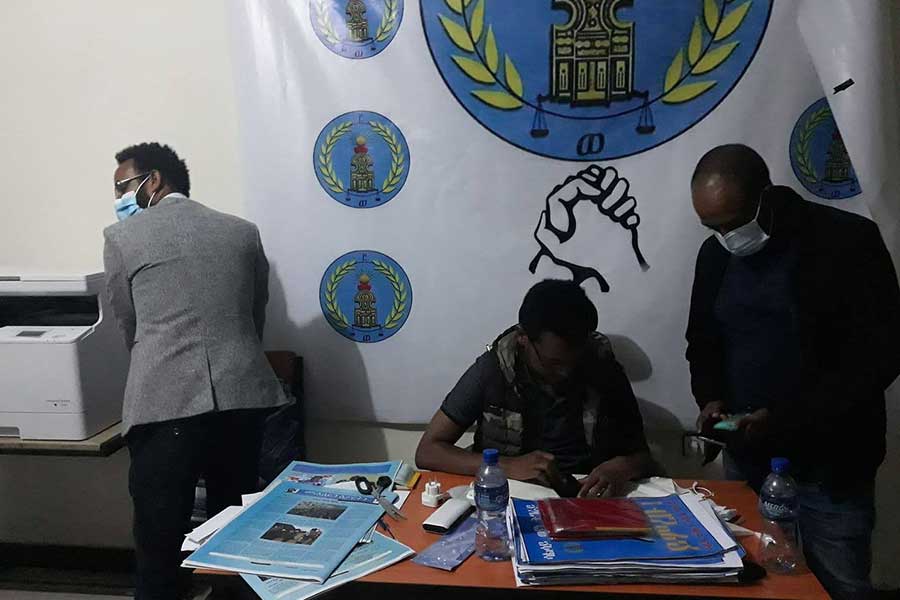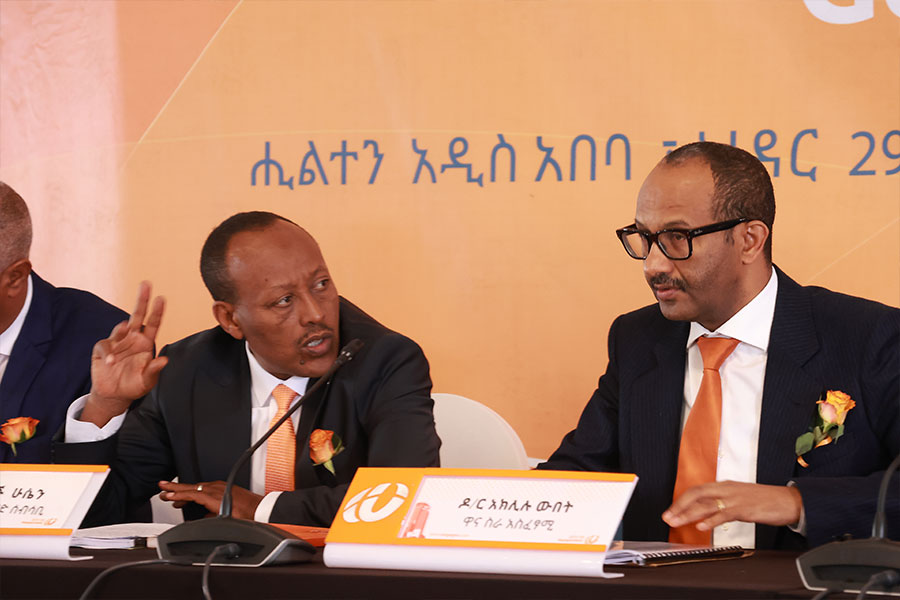
President Sahleworq Zewde's address to the joint session of the two legislative houses last week laid down the federal government’s plans for the fiscal year. It stood stark against the backdrop of a recent civil war, yet the Administration of Prime Minister Abiy Ahmed insisted that recovery is on the horizon.
The Administration claimed economic growth of 7.5pc last year, buoyed by what the President dubbed a "multidimensional development strategy." It is 1.4 percentage points higher than the IMF projected for the fiscal year, yet the government embarked on its third year of a 10-year plan, targeting even more ambitious GDP goals at 7.9pc of the current year.
Sahleworq`s address to legislative chamber members comes at a crucial moment. The civil war in the north and political tensions across regions have dealt the economy a hard blow. Still, she emphasised Ethiopia's achievements on the economic, financial, and political fronts over the past year. Tightening monetary policy, an attempt to counter the high inflation rate hovering around 29pc, was the highlight of the President`s speech. The expansion of Sunday markets, school feeding programs, and a focus on boosting productivity formed part of the recovery arsenal, according to President Sahleworq.
The federal government's revenue blueprint includes mobilising 441 billion Br in taxes. It is also eyeing an 801.6 billion Br federal budget, with debt repayment carving out almost a fifth of this sum. A significant development project, the Grand Ethiopian Renaissance Dam (GERD), remains high on the list of infrastructure goals.
“We`ve been toiling under poverty for not using our blessings,” said the President.
The President`s upbeat tone about GDP growth and positive prospects struck a chord. However, it also drew attention to what was left unsaid. As the country's leaders hailed the economy's recovery, critics quickly pointed out that GDP growth does not always reflect a public's welfare. The chasm between GDP growth and actual quality of life, especially in an environment characterised by extreme income disparities, stresses the broader debate over whether politicians merely wield economic figures as optics rather than improving the ground realities.
A report from UN-OCHA, released on the day of the President's address, paints a different picture.
Over 20 million Ethiopians require emergency food aid, while another four million need varied and urgent assistance.
Atlaw Alemu (PhD), an economist at Addis Abeba University, weighed in on this dichotomy, emphasising that the initial intent behind GDP computation was to guide tax policy and manage government expenditure. He stressed the importance of income redistribution channels in a functional economy for GDP growth rates to point to improvements in the lives of citizens.
“Even if no one eats, GDP grows as long as the government keeps spending,” said Atlaw.
He said that under severe income inequality and high pubic expenditure, GDP targets mean little to citizens` consumption patterns.
"Inflation is mostly a monetary policy issue," the economist told Fortune.
President Sahleworq did not shy away from addressing the political issues. Themes of reconciliation flowed throughout her address, sentiments that wars only have a victor, while everyone would emerge victorious in negotiations. Talks of national dialogues for conflict resolution and the essentiality of unity resonated. She asserted that the federal government had achieved "broader acceptance" post the Northern War.
Her calls for a shared and inclusive narrative received an applause from the 469 MPs in attendance, including the Speakers of Parliament and the House of Federation, Tagesse Chaffo and Agegnehu Teshager, respectively, and the Prime Minister.
However, such declarations did not sit well with everyone. The irony was lost on members of the National Movement of Amhara (NaMA), whose notable leaders were taken by security forces during the year. MPs from NaMA expressed strong reservations, recalling the detention of their leaders, including Christian Tadele. An MP elected under the NaMA platform and chair of Parliament`s Public Expenditure Administration & Audit Affairs, Christian remains in detention under the state of emergency Parliament declared to quell the insurgency in the Amhara Regional State.
Abebaw Desalegn, an MP-NaMA, challenged the assertions of widespread endorsement to the government. He urged for "genuine dialogue and trust-building," given the precarious security situation in regional states such as Amhara, where his constituencies live. He stressed that attaining wholesome economic progress is a tall order under the prevailing political climate.
Abebaw pointed out a communication gap between the needs of citizens and decisions passed down by the executive branch, indicating that a top-down approach characterises decisions.
"They seem to be dislodged from the realities of citizens," he told Fortune. "Amusement parks are not priorities of the majority."
While opposition MPs strongly emphasise the skirmishes in the Amhara Regional State, others from the incumbent party echoed the calls for peace to fuel economic growth. They acknowledged the economic strides made but also conceded that conflicts across the country have dented gains.
“You can imagine what could have happened under peaceful circumstances,” said Kamil Shemsu, an MP-PP.
Unemployment is slated as the next frontier to tackle, with the President announcing plans to find overseas employment opportunities in five countries for half a million Ethiopians.
At the home front, the federal government pledged to create three million jobs, heavily betting on the agriculture sector, where the authorities hope to see 810 million quintals of grain farmed from 22 million hectares of land. Export revenues are projected to rise to 4.3 billion dollars, up from 3.6 billion dollars last fiscal year.
Experts view these projections with scepticism, considering the country's volatile situation.
There is the ever-present challenge of ensuring consistency in the supply chain. Recent records – characterised by droughts, locust invasions, and conflicts – should offer a cautionary tale, according to Mathios Ensermu, a supply chain and logistics expert. Citing the previous year's severe foreign currency shortages, which led to fertiliser supply constraints, he warned against complacency. Only 34pc of the initially planned 1.2 million tonnes of fertiliser arrived in the country by May 2023.
“Fertiliser and irrigation need to be guaranteed to prevent a food crisis," he said. "Setting a high target will prompt officials to increase their efforts, even if they don't make it."
PUBLISHED ON
Oct 14,2023 [ VOL
24 , NO
1224]

Commentaries | Apr 01,2023

Agenda | Sep 06,2020

Viewpoints | Nov 05,2022

Fortune News | Nov 21,2020

Radar | Jun 14,2020

Agenda | Jul 28,2024

Fortune News | Oct 26,2019

Fortune News | May 29,2021

Radar | Dec 12,2023

Commentaries | Nov 16,2024

Dec 22 , 2024 . By TIZITA SHEWAFERAW
Charged with transforming colossal state-owned enterprises into modern and competitiv...

Aug 18 , 2024 . By AKSAH ITALO
Although predictable Yonas Zerihun's job in the ride-hailing service is not immune to...

Jul 28 , 2024 . By TIZITA SHEWAFERAW
Unhabitual, perhaps too many, Samuel Gebreyohannes, 38, used to occasionally enjoy a couple of beers at breakfast. However, he recently swit...

Jul 13 , 2024 . By AKSAH ITALO
Investors who rely on tractors, trucks, and field vehicles for commuting, transporting commodities, and f...

Jun 28 , 2025
Meseret Damtie, the assertive auditor general, has never been shy about naming names...

Jun 21 , 2025
A well-worn adage says, “Budget is not destiny, but it is direction.” Examining t...

Jun 14 , 2025
Yet again, the Horn of Africa is bracing for trouble. A region already frayed by wars...

Jun 7 , 2025
Few promises shine brighter in Addis Abeba than the pledge of a roof for every family...